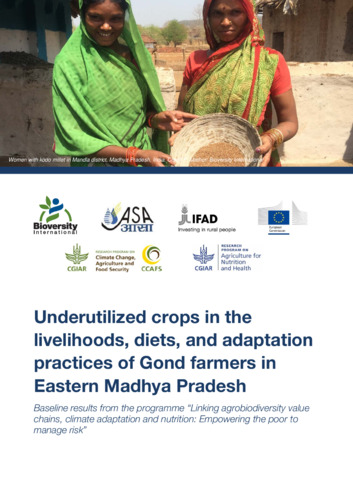Underutilized crops in the livelihoods, diets, and adaptation practices of Gond farmers in Eastern Madhya Pradesh, India: Baseline results from the programme “Linking agrobiodiversity value chains, climate adaptation and nutrition: Empowering the…
The programme “Linking agrobiodiversity value chains, climate adaptation and nutrition: Empowering the poor to manage risk” funded by IFAD and the European Union from 2015 to 2018 aims to strengthen the capacities of farmers to manage risks associated with climate change, poor nutrition status, and economic disempowerment through agrobiodiversity-based solutions. Enhancing productivity and promoting use of nutritious and climate-hardy underutilized species is the core of the initiative, which is focusing on minor millets and native vegetables in Madhya Pradesh. The approach is two-prong, involving on one hand
targeted value chain activities for the minor millets, which are widely recognized for their important role in supporting climate change adaptation and food security in India and which show growing market potential, and on the other hand, exploratory work on native vegetables that aims to document and identify high potential species that can fill nutrition gaps in critical seasons. A holistic approach addressing multiple bottlenecks in supply and demand is being applied for the minor millets (and later for promising native vegetables), engaging consultation and participation of multiple stakeholders to ensure the interventions are
pro-poor and gender-sensitive and to advocate for supportive policies .

